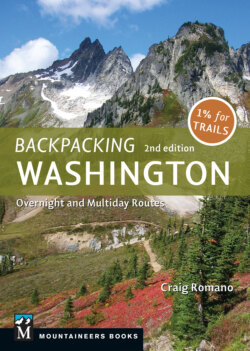Читать книгу Backpacking Washington - Craig Romano - Страница 16
На сайте Литреса книга снята с продажи.
WILDERNESS ETHICS
ОглавлениеTo ensure the long-term survival of our trails—and more specifically the wild lands they cross—we must embrace and practice a sound wilderness ethic. A strong, positive wilderness ethic includes making sure we leave the wilderness in as good (or even better) a condition as we find it. But it goes beyond picking up after ourselves when we camp by a lake or go for a hike. We need to ensure that our elected officials and public land managers recognize and respond to our wilderness needs and desires.
Mount Bretherton reflecting in Upper Lena Lake (Trip 10)
WHAT’S YOUR HIKING FOOTPRINT? LEAVING NO TRACE
All of us who recreate in Washington’s natural areas have a moral obligation to respect and protect our natural heritage. Everything we do on the planet has an impact—and when we take to the woods, we should strive to have as minimal an impact as possible. The Leave No Trace Center for Outdoor Ethics is an educational, nonprofit, apolitical organization that promotes responsible enjoyment and active stewardship of the outdoors.
According to the center, “Leave No Trace is best understood as an educational and ethical program, not as a set of rules and regulations.” And their message is framed by these seven principles:
1.Plan ahead and prepare.
2.Travel and camp on durable surfaces.
3.Dispose of waste properly.
4.Leave what you find.
5.Minimize campfire impacts.
6.Respect wildlife.
7.Be considerate of other visitors.
Visit https://lnt.org to learn more.
